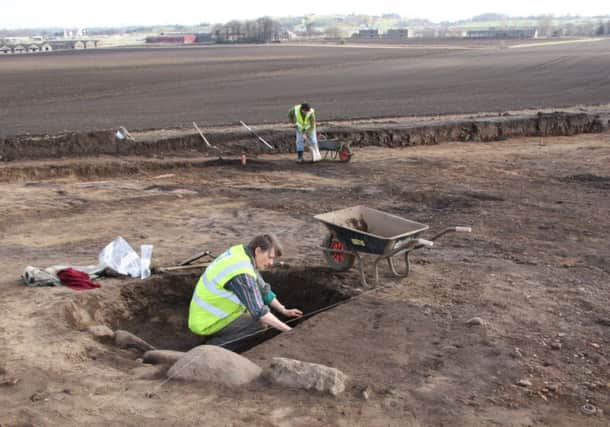Tram works unearth piece of Scottish prehistory


Analysis of finds made near Edinburgh Airport provide the most complete picture yet of the city’s early settlement stretching back to almost 4,000BC. Research due to be published in 2015 will reveal evidence of up to six phases of occupation on a ridge at Gogar Mains, near the Ingliston park-and-ride site.
CONNECT WITH THE SCOTSMAN
• Subscribe to our daily newsletter (requires registration) and get the latest news, sport and business headlines delivered to your inbox every morning
Advertisement
Hide AdEdinburgh City Council experts believe more will be found when the area – which has been earmarked for development – is built on.
Council archaeology officer John Lawson said: “The tram work has been very important for the archaeology of Edinburgh. It’s given us a real slice through time. This is especially the case at the Gogar sites because much of the prehistoric landscape has been lost by the urban development of the city over the last 100 years.
“The excavations at Gogar have given us an important snapshot of how Edinburgh grew as it has given evidence from a wide range of periods, from early prehistoric Mesolithic hunter-gathering communities through to the medieval period.”
The site is on a narrow ridge about 100 metres long, above the flood plain of the River Almond. Lawson said analysis of the remains of ditches showed five or six phases of occupation, stretching back some 5,500 to 6,000 years.
He said: “Possibly the earliest evidence was pits containing hazelnut shells, which may be from Mesolithic hunter-gathers. These were found alongside a range of pits and post-holes dating from around the start of the Neolithic period in Scotland around 3,960BC, making it Edinburgh’s – and one of Scotland’s – first farming communities.
“There then appears to be a large gap in occupation until the construction of a series of hut-circles around 2,200 to 2,000BC during the Early Bronze Age, then a 400-year gap to around 1,600-1,200BC.
Advertisement
Hide Ad“That suggests the farming communities were moving to different parts along the same ridge. The largest site was a palisaded enclosure roughly 35m-diameter, which has been dated to 700 to 540BC, coinciding with the start of the Iron Age.
“This may have been used as an animal pen rather than for human occupation as no evidence for a dwelling was found within it.
Advertisement
Hide Ad“Cattle, pigs and sheep are likely to have been kept over the different periods, however the soil conditions have meant bone has not survived.
“The limited artefacts found included flint from the Neolithic period, small blades of Arran pitchstone, along with small quantities of pottery from the Neolithic to the Iron Age.
“By implication, more archaeology lies outwith the line of the tram route, so if Edinburgh develops the site, more will turn up.”
However, Lawson said that should not deter potential developers as archaeological digs were a well-established part of building projects.
City council culture and sport convener Richard Lewis said: “This great city and its surrounds boast such an incredibly rich history that it can almost feel as though something headline-worthy is uncovered every time a spade is sunk into the soil in Edinburgh. Yet again, archaeologists have given us a fascinating insight into past civilisations who once called this place home.
“It’s amazing to think we now have evidence of Edinburgh’s first farming communities from the Neolithic era, some 6,000 years in the past.”
Advertisement
Hide AdWork on the £776 million Edinburgh Airport to city centre tram route started in 2008 and services, left, started running in May this year.
SCOTSMAN TABLET AND IPHONE APPS